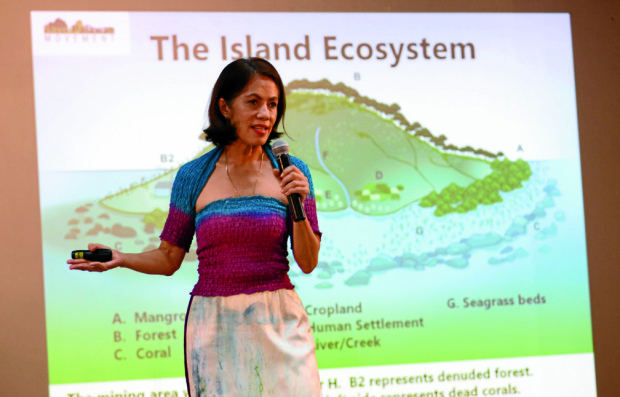Lopez faces off with pro-mining students over audit
MANILA — Environment and Natural Resources Secretary Gina Lopez found herself under fire on Monday when she held an impromptu dialogue with a protesting crowd of “responsible mining” advocates, composed mostly of students and several miners from Zambales and Benguet.
The protesters demanded transparency in the recently concluded seven-month mining audit, which culminated in closure and suspension orders on 30 metallic mines across the country.
In a statement read out as the protesters waited for Lopez at the Department of Environment and Natural Resources Central Office, the University of the Philippines Mining Engineering Society said: “For as long as the transparency of the mining audit remains inaccessible, as future engineers, we shall keep invoking our right to access detailed information regarding the said mining audit in order for us to know what needs to be improved in the industry and to aid in the advancement of the profession toward environmental protection so as to avoid the suspension of more mining companies compromising jobs and Filipino families.”
When Lopez arrived and opened the dialogue, a student asked her: “Where’s the evidence relating to massive corrosion and landslides in watersheds for each particular mine? Unless we see the detailed mining audit, how can we know for sure your assessments are valid?”
Lopez stood her ground, however, that “we have followed the law in every single step. And we have the documents to prove it.”
While admitting that that she initially refused to release to the public or the media the recommendations of the mining audit technical review committee, she explained: “I didn’t want to give it before because their [the committee’s] penalties were fines, but I didn’t agree with them on the penalties.”
The recommendations were already uploaded to the DENR’s website last Thursday.
Asked why she didn’t follow the review committee’s recommendations on implementing just fines, and proceeded to order closures and suspensions instead, Lopez explained that she had the prerogative to base her decisions on her policy “that there should be no mining in watersheds.”
“If there’s a violation, the Cabinet secretary is in full rights to make a decision. The study of the MGB [Mining and Geoscienes Bureau] agreed that there are violations. Where we didn’t agree were the penalties. They just wanted to fine. But when you fine, the money doesn’t go to the people. It goes to the national treasury. What kind of penalty is that? Because I saw there were violations in watershed, I wanted them closed. Because you really cannot and must not do mining in watersheds,” Lopez said.
Another student then pressed her for a definition of “watershed.” In her press conference announcing the audit results, Lopez said she was closing down mines not just in legally “proclaimed” watersheds, but in “functional” watersheds.
Lopez responded by showing her slideshows of the mines she had ordered closed, which she claimed were in watersheds.
Lopez also told the protesters that as of 2015, only two mining companies had placed money in a legally required rehabilitation fund. Not complying with the rehabilitation fund, Lopez pointed out, could also be a “reason for closure.”
The students, however, remained unimpressed, as Lopez admitted she had yet to see a 2016 update on the matter.
A student had accused Lopez of releasing “incomplete” audit results, and claimed the audit did not go through due process because “ipinagsawalang bahala proseso ng MGB. Dapat legally at technically, fine sa companies, naging suspension. Kami po ay nababahala sa magiging epekto nito sa bansa, sa komunidad na nakasalalay ang buhay sa pagmimina, at higit sa lahat sa mga pamilyang mahirap. Ang mga minero at minera may karapatan din maging sagana.” (MGB processes were set aside. Legally and technically, fines should have been imposed on companies but suddenly, the penalties turned into suspensions. We are bothered and worried by the effects of these closures and suspensions on the country, on the communities that depend on mining and most importantly, on poor families. Miners have the right to prosper.)
Lopez had countered, before she left after nearly an hour talking with the protesters: “Yung mga magsasaka, mangigisda, hindi ba importante buhay nila? (Are the lives of farmers and fishermen not important?) You really can’t tell me hindi sila nagdusa (that they’re not suffering)….Why can’t we have economy where you have work everyday? Why can’t we have businesses where the money goes to you? I’m not your enemy. I want to help you live a better life…and if some people benefit but many people suffer, that’s not the way to go. I want to help you get out of poverty, but I want to do it the right way,” Lopez said.
As the students continued to demand that Lopez produce copies of the audit results, she insisted the documents were open for the public to see.
“You can see everything we have. What do you want me to do? Bring a whole boatload of documents for you here to see? Why don’t you all go there en masse and see the audit yourself?” Lopez said, referring the students to the Mines and Geosciences Bureau. SFM
